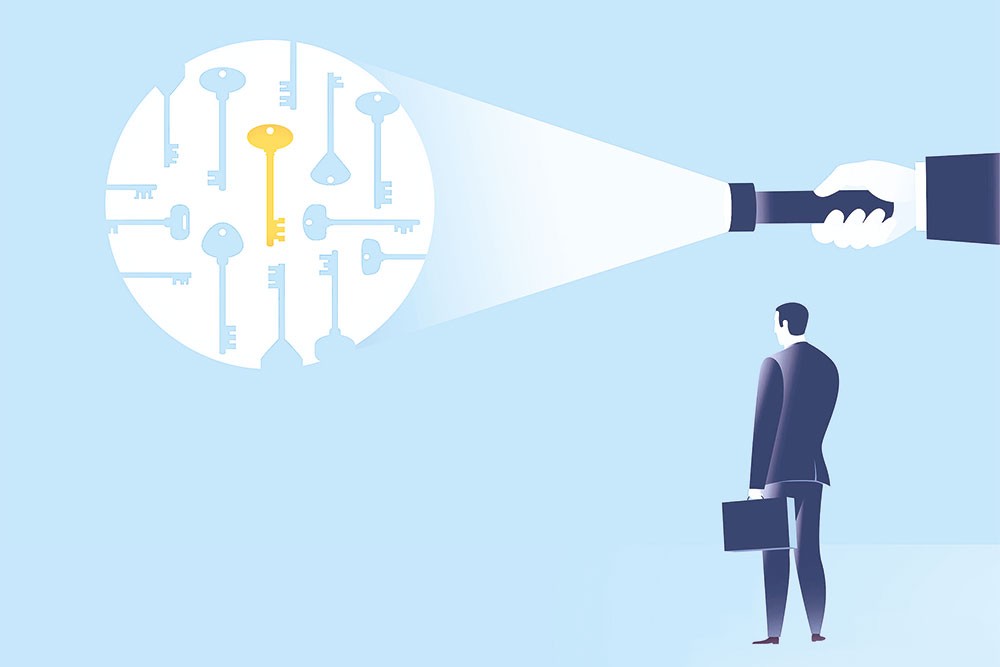The question from the new graduate was simple: ‘What do I need to be good at to succeed in this company?’ The senior leader paused. It should have been the perfect moment to refer to the organisation’s newly launched competency profile, but that felt like too glib an answer and – if she was being honest – a little hollow.
In the split second before answering this eager and ambitious engineer, she recalled a key moment in her own leadership journey a few years before: as the senior leadership team had gathered for their annual strategy offsite meeting, an unprecedented global PR disaster struck for which there was no playbook. What had got them through those challenging few hours and days was not a competency profile but how they had worked together as a team to face the truth of what had happened, and then to talk authentically with staff and shareholders with humility, accountability and courage.
Senior leaders across private, public and third sectors alike now face more and more unprecedented situations as we edge towards the full-scale effects of Industry 4.0 – the fourth industrial revolution’s blurring of boundaries between the physical, digital and biological worlds – which has already disrupted so many markets. Not only is this disruption new, but its greater scale and frequency generate more complex business challenges for which tried and trusted leadership approaches often prove inadequate.
If the context for leadership skills is rapidly changing, so are the expectations of younger generations preparing for progression into and through that world of work. For the first time, four generations are sitting side by side in offices doing jobs that didn’t exist when millennials and even Gen Z were at school. The younger generations want different things: they don’t trust business (or the political system) the way their older colleagues did; they value experience; they demand to be trained and developed; and they hold business leaders accountable for turning corporate purpose into meaningful action.
The development of leadership skills is an iterative building of learning through discovery, feedback and honest self-reflection
So what should be the advice about skills for success to the new graduate entering the workforce? And what do leaders need to be good at now to make quick and robust business decisions, and prepare the next generation to step into their shoes? Clues can be found in both the context for leadership of the fourth industrial revolution, and the expectations of those they are leading.
Agile and active
Even long-standing market sectors with high barriers to entry can now change virtually overnight, so leadership agility is key. Agility is more of a mindset or way of thinking than a specific skill. It’s about being open to new ideas and prepared to let go of tried and tested solutions. It involves listening to people up and down the organisation as well as outside it, and tuning into what’s not said as much as what is. Because gathering multiple viewpoints brings the risk of being overloaded with options, which can delay or cause inconsistent decisions, active listening is also a requirement – being able to filter out distractions while staying grounded and centred.
Those opinions exist in all parts of the organisation’s eco-system where there are multiple relationships with suppliers, partners and customers. The boundaries of those relationships are often blurred, so it’s the quality of those relationships that become the currency for success. A leader has to attend to many stakeholders inside and outside the organisation and be accountable to each. The leader needs to collaborate, to co-create through rapid prototyping, and to lead change. Creating the future means thinking systemically and globally against environmental and social criteria as well as financial imperatives.
The vogue for the purpose-led or values-led organisation can’t just be a tickbox exercise any more because customers and colleagues – particularly younger ones – vote with their wallets and their feet. In a similar vein, creating a diverse workforce isn’t in itself enough. The leader needs to be a champion and role model for inclusion of many different kinds of people – from the visible, such as race and gender, to the less visible, such as some disabilities and neurodiversity. Having an intellectual understanding of the benefits of shared organisational values or the business case for diversity isn’t enough. The leader needs genuinely to feel connected and committed to these principles so that every aspect of their behaviour right down to the smallest gesture reflects them.
Humble strength
Business schools or traditional leadership development programmes by themselves are rarely the answer for getting leaders future-ready. Helping leaders develop humble strength – the courage to act based on a clear intent in an authentic and engaging way – is not the stuff of the classroom. Future-ready skills are developed by having different and diverse experiences, where leaders are pushed to the edge of their comfort zone in a safe environment where they can integrate their learning into their ongoing leadership practice.
Defining skills for success is not a static phenomenon, a standard that is reached or a model to be strived for. It is an iterative building of learning through discovery, feedback and honest self-reflection. Neuroscience tells us that the brain doesn’t stop developing – it is continually changing and has the ability to create new neuropathways that provide new and rich choices.
Can a leader therefore ever be future-ready? Perhaps the competency model needs to make way for a commitment to ongoing personal and professional growth that focuses less on the ‘adding’ of skills and more on deeper reflection and authenticity.




